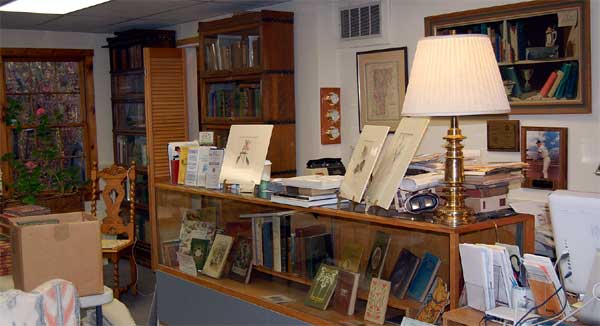T: Does it bother you that books can accumulate shopwear from people handling them?
G: Yes it does, which is why we try to put more and more behind glass. I have travel wear on my books. That bothers me. But we buy yards and yards of bubble wrap which I use when I pack for shows. Road miles are hard on show books.
T: One of the things I like about selling on the internet is that a book sits on the shelf until I am ready to ship it. Our storage area is dust-free for some reason. I've got books that have been there for four years and not a speck of dust on them.
G: My friend David Carlson, D. and D. Galleries down in Summerville, New Jersey, has a schizophrenic book-life. When he and Denise, his lovely wife, are at a show, they bring an amazing selection; all these beautiful fine-leather bindings, wonderfully serious books. And they also have this warehouse space in an industrial park and that's his online business. They have thousands and thousands of books online, but when you walk into the space, they're all piled up on metal shelves, top-edge out, with number slips sticking out. So if they need book #10206, they know what rack and what pile to go to. You couldn't possible browse it. But they're not there to be browsed. And he gets more books on the shelves that way.
T: So he's both a seller of fine books and a mass-marketer on the internet.
G: Exactly. But that mass marketing aspect of his business is lucrative. He's selling numbers that are making it worthwhile for him, and the low-end can support the high-end. I think Dave does it brilliantly!
I look upon online selling like our days in Maine, when we sold lots of inexpensive books. Cumulatively you would come up with a fair amount of money at the end of the year, from selling these modest and essentially inexpensive books, which would allow you to go and buy the pricey exciting good books.
T: The danger is if you get too far into the mass-marketing aspect, at some point you are just doing it for the money.
G: Nothing wrong with that. I remember Lew Weinstein of Heritage Bookshop saying he had become more successful than other booksellers because he was never mesmerized by the book. He was never enthralled by the romance of the book. He was there to sell books for money, more money than he paid for them. Even though he did collect books himself -- he collected golf books -- he made a lot of money by selling books for a lot more than he paid for them.
T: Do you still collect Custer?
G: No I sold my Custer collection with tears in my eyes. Priced it all out and put it in the shop one day, secure in the fact that no one could possibly pay those kind of prices. I priced them high. I priced them at a point where I thought no one would buy them. And this fellow just walked right in a started stacking them up. This was some years ago.
T: You must have been glad you had priced them high.
G: No, I really didn't want to sell them. But I thought I was making the right gesture by bringing them into the shop and pricing them and all that. And this crazed man bought them. He eventually bought my house and barn as well and went into the book business. He's still there. His name is George Arrington. Arrington Books in Wells, Maine. He's a military specialist and he is very good at it. He also was Custer nut.
So then I put the collection together again. I bought all those books again. And I sold that. Today I collect books, ephemera and graphics dealing with T.R. And I collect, and have for some years, American fly fishing books. And books written by John McPhee, the great New Yorker essayist. Also novelist and poet, Jim Harrison (a writer whose work has been compared to Faulkner and Hemingway).
